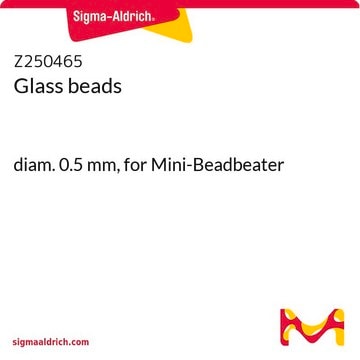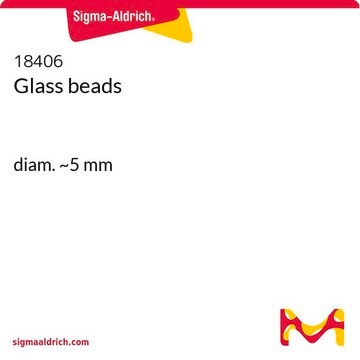G9143
Glass beads, unwashed
212-300 μm (50-70 U.S. sieve)
Sinónimos:
Raw Glass Beads
Iniciar sesiónpara Ver la Fijación de precios por contrato y de la organización
About This Item
Código UNSPSC:
41100000
NACRES:
NB.22
Productos recomendados
tamaño de partícula
212-300 μm (50-70 U.S. sieve)
Aplicación
Unwashed glass beads have been used for the extraction of DNA from Fonsecaea sp.
Código de clase de almacenamiento
11 - Combustible Solids
Clase de riesgo para el agua (WGK)
WGK 3
Punto de inflamabilidad (°F)
Not applicable
Punto de inflamabilidad (°C)
Not applicable
Equipo de protección personal
Eyeshields, Gloves, type N95 (US)
Certificados de análisis (COA)
Busque Certificados de análisis (COA) introduciendo el número de lote del producto. Los números de lote se encuentran en la etiqueta del producto después de las palabras «Lot» o «Batch»
¿Ya tiene este producto?
Encuentre la documentación para los productos que ha comprado recientemente en la Biblioteca de documentos.
Los clientes también vieron
Mohammad Javad Najafzadeh et al.
Emerging infectious diseases, 17(3), 464-469 (2011-03-12)
To assess population diversities among 81 strains of fungi in the genus Fonsecaea that had been identified down to species level, we applied amplified fragment-length polymorphism (AFLP) technology and sequenced the internal transcribed spacer regions and the partial cell division
Renata R Gomes et al.
PLoS neglected tropical diseases, 10(11), e0005102-e0005102 (2016-11-29)
The human mutilating disease chromoblastomycosis is caused by melanized members of the order Chaetothyriales. To assess population diversity among 123 clinical strains of agents of the disease in Brazil we applied sequencing of the rDNA internal transcribed spacer region, and
Fusarium species causing eumycetoma: Report of two cases and comprehensive review of the literature.
Abdullah M S Al-Hatmi et al.
Mycoses, 60(3), 204-212 (2016-12-09)
Recently, mycetoma was added to the World Health Organization's list of neglected tropical disease priorities. Fusarium as a genus has been reported to cause eumycetoma, but little is known about the species involved in this infection and their identification. In
Jalila Mohsin et al.
Mycoses, 60(9), 569-575 (2017-07-08)
Candida auris has been recognised as a problematic healthcare-associated emerging yeast which is often misidentified as Candida haemulonii by commercial systems. Correct early identification of C. auris is important for appropriate antifungal treatment and implementing effective infection control measures. Here we
M J Najafzadeh et al.
Mycopathologia, 183(4), 669-677 (2018-03-06)
The black yeast genus Exophiala includes numerous potential opportunistic species that potentially cause systematic and disseminated infections in immunocompetent individuals. Species causing systemic disease have ability to grow at 37-40 °C, while others consistently lack thermotolerance and are involved in diseases
Nuestro equipo de científicos tiene experiencia en todas las áreas de investigación: Ciencias de la vida, Ciencia de los materiales, Síntesis química, Cromatografía, Analítica y muchas otras.
Póngase en contacto con el Servicio técnico












